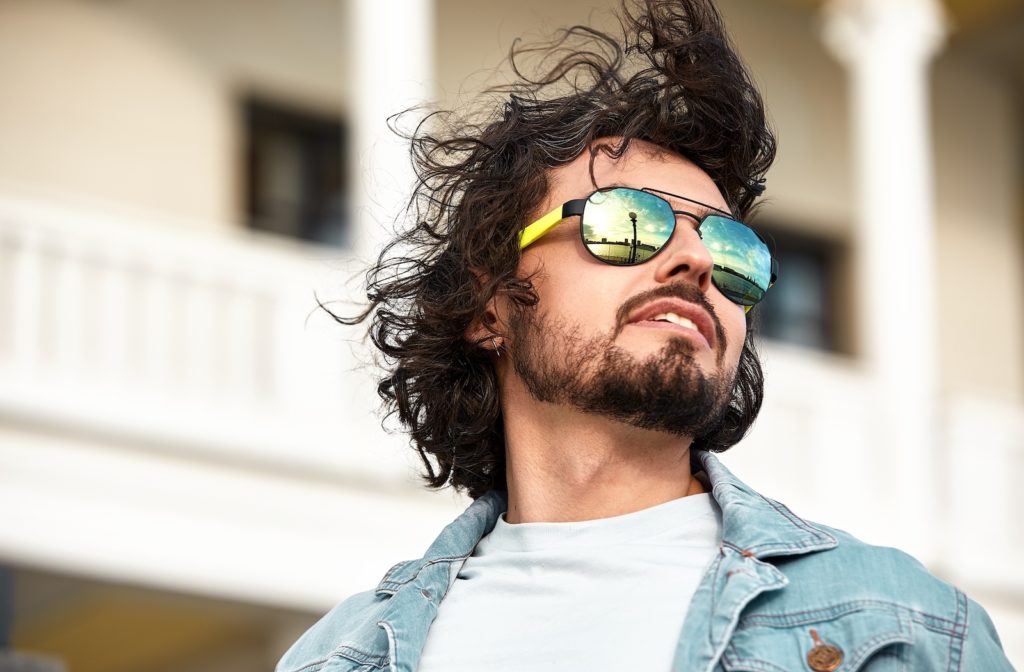Who would think that something like our eye colour could determine how safe we are in the sun? Well, blue eyes—along with other light colours like grey or green—are more sensitive to damage from the sun. With that said, darker colours aren’t immune to damage, so everyone should prioritize protecting their eyes when outdoors—regardless of their eye colour.
Wearing sunglasses with adequate UV protection and a wide-brim hat are 2 ways of reducing the risk of sun damage to your eyes or the sensitive skin around them. Photokeratitis is a form of temporary discomfort to the eye that can occur from sun exposure. It’s a good idea to book an appointment for an eye exam with your optometrist if you’re experiencing any persistent symptoms, especially after being outside without eye protection.
The Science Behind Eye Color
Eye colour is determined by the pigmentation of the iris and the way light scatters off the melanin in it. The more melanin, the darker the eye colour. Your particular eye colour is determined by the genetic makeup of your parents, and while a baby’s eye colour might change a little in the first few years, once they settle it is usually for good.
Blue Eyes & Sun Sensitivity
Research suggests that blue-eyed folks might need to be more vigilant regarding their sun exposure. This is because lighter eyes mean less melanin, so they offer less protection against the sun’s harmful UV rays compared to their darker-coloured counterparts.
Understanding the Role of Melanin
Melanin doesn’t just play a starring role in determining our eye colour—it’s also crucial for protecting our skin and eyes from sunlight because it absorbs UV radiation. Less melanin means less natural protection, paving the way for increased sensitivity.
This doesn’t mean that only blue-eyed individuals need to worry about sun safety, but it does mean an added layer of caution might be beneficial.
Why Bother Protecting Our Eyes from the Sun?
The sun is essential for life, but it emits ultraviolet (UV) rays that can be less than friendly to our eyes. These UV rays are invisible to us but can harm various parts of the eye and surrounding tissue like a sunburn. Over time, consistent exposure without adequate protection can accumulate damage, risking our vision and the health of our eyes.
Cataracts
Cataracts are a condition that involves a clouding of the eye’s lens and are common as we age. But studies show that UV exposure can increase your chances of developing cataracts, so it’s worth doing what you can to protect your eyes.
There is no way to reverse or cure a cataract. The only treatment available is cataract surgery, where the clouded lens is removed and replaced with an artificial lens.
Macular Degeneration
The macula, a part of the retina, is crucial for clear, central vision. Macular degeneration affects the central vision and is the leading cause of blindness in adults over 50 in North America. Typically age is the primary predictor, hence it being called age-related macular degeneration (AMD). Unfortunately, UV light can accelerate degeneration, potentially leading to vision impairment or blindness in severe cases.
Photokeratitis
Photokeratitis is a painful eye condition that results from UV exposure, essentially sunburn of the cornea and conjunctiva. The sources of UV radiation can include direct sunlight, reflections from snow, water, or sand, tanning beds, and even certain types of artificial lighting used in welding.
Prevention is key when it comes to photokeratitis. Wearing sunglasses or goggles that block 100% of UV rays can significantly reduce the risk of developing this condition. It’s also important to remember that cloudy days don’t block UV light, so eye protection is necessary even when the sun isn’t visible.
Tips for Protecting Your Eyes
You may have to be extra careful in the sun with light-coloured eyes. But everyone should take some basic precautions for their eyes when spending time outside in the sun—regardless of the colour of their eyes.
Choose Sunglasses Wisely
Not all sunglasses are created equal. Look for ones that block 100% of both UVA and UVB rays. Polarization is a popular coating or lens design, and most polarized glasses will likely provide UV protection, but it’s not automatic. So, it’s crucial to confirm this when picking out sunglasses when your goal is adequate protection. Your optometrist can help you pick sunglasses that meet your needs.
Wear a Hat
Although wearing a wide-brimmed hat doesn’t replace wearing sunglasses, it can reduce the UV rays reaching your eyes. It’s a stylish addition to your sun protection arsenal that protects your eyes and helps protect the sensitive skin around your eyes.
UV-Protective Contacts
Again, they don’t replace wearing sunglasses, but UV-protecting contact lenses are a thing. They don’t protect the entire eye, but they add an extra layer of defense for UV rays that may make it past your sunglasses. We’re happy to review options with you at your next contact lens exam.
Discuss Your Sunglasses Options with Your Eye Doctor
Blue eyes or not, you need to protect your peepers when spending time enjoying the beautiful summer sun. It’s not difficult to find adequate protection, but it does require some specific eyewear. Your eye doctor can help you pick out sunglasses that provide the protection you need.
Call our team at West Coast Optical today. We’re happy to book you an exam if you need to update your prescription. Otherwise, one of our professional opticians can help you pick out your next pair of sunglasses.



